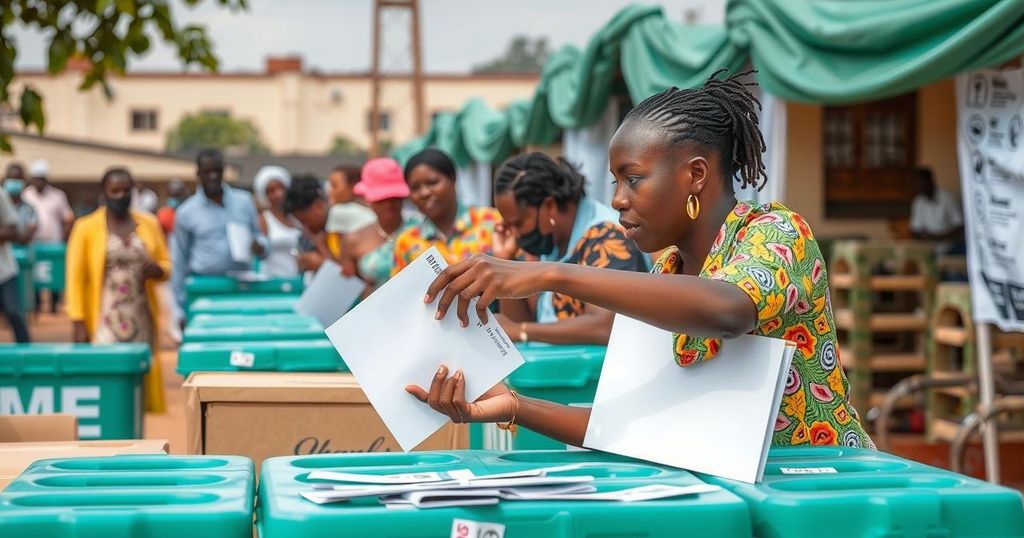Polls in Ghana opened for presidential and parliamentary elections amid economic turmoil. With 18.7 million registered voters, the election is primarily a contest between Vice President Mahamudu Bawumia of the ruling NPP and former President John Mahama of the NDC. Economic challenges such as inflation, unemployment, and illegal gold mining dominate the electoral discourse as public dissatisfaction grows. This election serves as a litmus test for democracy in a region facing instability.
On a significant day for Ghana’s democracy, polls have opened for presidential and parliamentary elections amidst a severe economic crisis that weighs heavily on the electorate. The West African nation, once celebrated for its democratic stability, now faces a pivotal moment as approximately 18.7 million registered voters navigate their choice among twelve presidential candidates. However, the election appears to be a contest primarily between the ruling New Patriotic Party’s (NPP) Vice President Mahamudu Bawumia and former president John Dramani Mahama of the National Democratic Congress (NDC), mirroring the two-horse races of previous elections since 1992.
This election comes at a time when Ghana’s economic landscape has been marked by soaring inflation and high unemployment rates. An Afrobarometer poll indicates that a staggering 82% of Ghanaians believe the country is on the wrong track, reflecting a widespread discontent with the current administration’s ability to resolve the ongoing economic hardships. Candidates have made their final campaign pitches, with Bawumia asserting his commitment to continue existing economic stabilization measures, while Mahama has framed his campaign around a need to “reset” vital aspects of governance and the economy alike.
As part of the electoral process, Ghanaians will also elect 276 members of parliament, with the current legislative dynamics showcasing a near stalemate between the NPP and NDC, each holding an equal number of seats in the 275-member body. Voter excitement is palpable in urban areas, where vibrant campaigning is evident through public events and promotional activities, yet an undercurrent of concern persists regarding the economic implications for voters.
The profound economic crisis defines this election. Ghana defaulted on much of its foreign debt last year, and the multifaceted nature of its economic challenges has persisted, with inflation reaching 54% at the close of the previous year. Additionally, the burgeoning issue of illegal gold mining threatens both the environment and public safety, as desperate individuals turn to illicit means for survival amid economic despair. As the people of Ghana head to the polls, the future of their democracy and economic viability rests upon their choices today.
Ghana has long been viewed as a model of democratic governance in West Africa, serving as a beacon of stability in a region beset by political upheaval. Historically, it has celebrated a series of peaceful elections since the adoption of multiparty politics in 1992, earning a reputation as a democratic stronghold. Nevertheless, recent years have presented severe economic challenges, with rampant inflation and unemployment drastically undermining public confidence in leadership. These escalating crises are indicative of the economic mismanagement that has occurred under successive administrations, which has led to widespread calls for change and reform in the political system.
The upcoming elections in Ghana present a crucial juncture for the nation’s democracy, particularly in light of the significant economic challenges that have plagued the country. As voters grapple with the choice between two principal candidates, the overarching sentiment is one of frustration and urgency for tangible improvement in governance and economic conditions. The results of this election may well determine the future direction of Ghana’s political and economic landscape, amid growing concerns about the implications of illegal activities and debts.
Original Source: www.voanews.com







